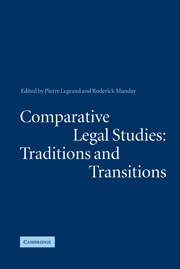Book contents
- Frontmatter
- Contents
- List of contributors
- Introduction
- Comparative legal studies and its legacies
- 2 The universalist heritage
- 3 The colonialist heritage
- 4 The nationalist heritage
- 5 The functionalist heritage
- Comparative legal studies and its boundaries
- Comparative legal studies and its theories
- Comparative legal studies and its futures
- Conclusion
- Index
2 - The universalist heritage
Published online by Cambridge University Press: 18 December 2009
- Frontmatter
- Contents
- List of contributors
- Introduction
- Comparative legal studies and its legacies
- 2 The universalist heritage
- 3 The colonialist heritage
- 4 The nationalist heritage
- 5 The functionalist heritage
- Comparative legal studies and its boundaries
- Comparative legal studies and its theories
- Comparative legal studies and its futures
- Conclusion
- Index
Summary
Unlike other contributors to this book, I discuss an approach to law which is at least two centuries out of fashion. We associate it with the natural-law schools that flourished before the rise of positivism in the nineteenth century. The jurists of these schools looked for principles which are universal, which underlie all legal systems. Here, I do not consider whether or not there are such principles. I ask what the approach of the natural lawyers can tell us about how laws may differ even when they are based on the same principles. As comparatists, we ought to be interested in how such differences are possible and what they are like. We can see such differences in modern legal systems. If we are sensitive to them, we can avoid the methodological error of assuming that principles must be different whenever we see a difference in laws. First, however, we must distinguish sharply between the approach of some seventeenth- and eighteenth-century natural lawyers who were influenced by philosophical rationalism and that of the earlier natural lawyers whose approach was based on ideas that stemmed ultimately from Aristotle and Thomas Aquinas.
The later rationalist approach was to try to deduce consequences as a mathematician would from supposedly self-evident principles. The difficulties are clear in retrospect. It is far from self-evident what the self-evident principles are. Moreover, many principles do not lead to a single set of consequences.
- Type
- Chapter
- Information
- Comparative Legal Studies: Traditions and Transitions , pp. 31 - 45Publisher: Cambridge University PressPrint publication year: 2003
- 6
- Cited by



